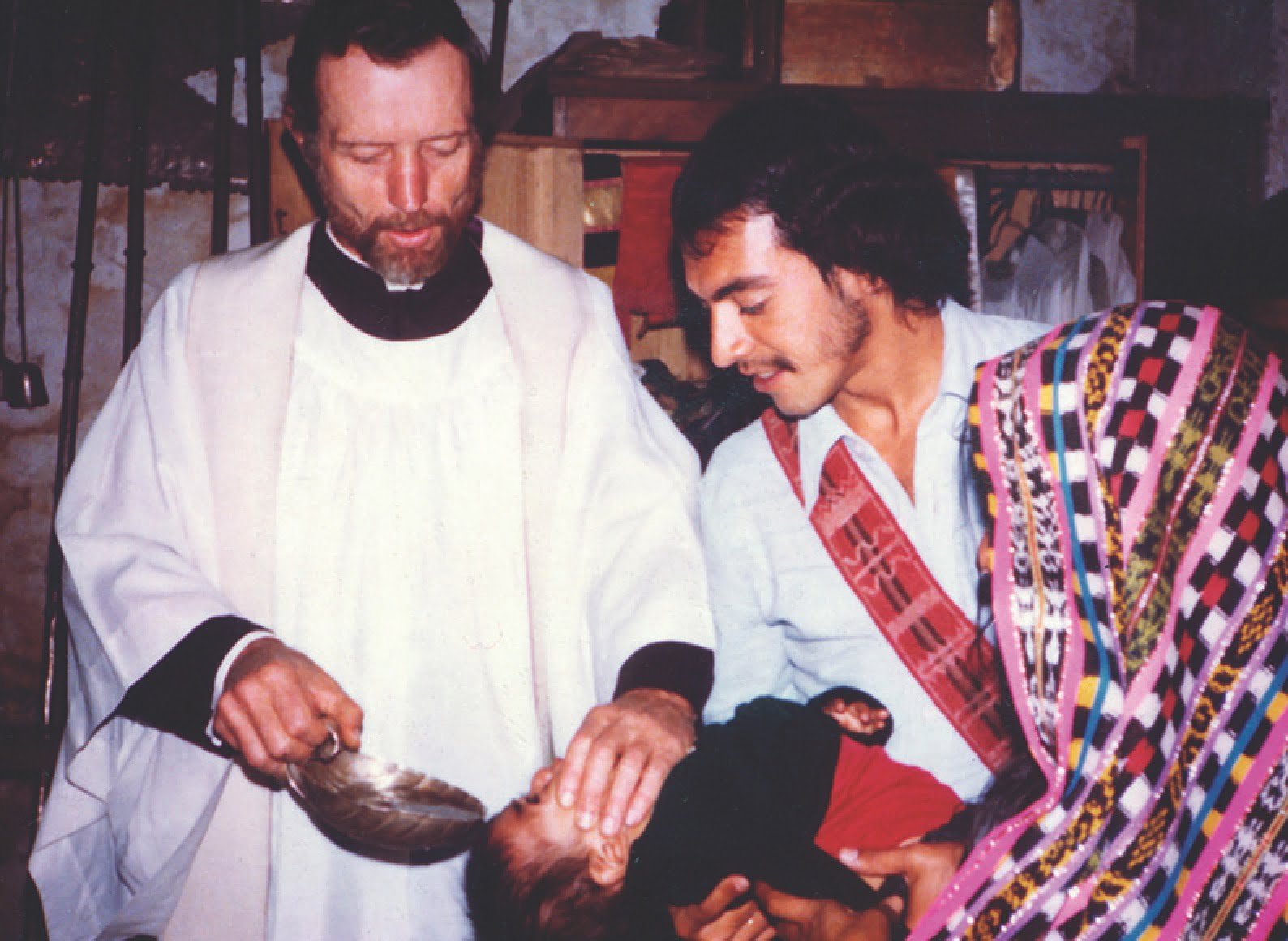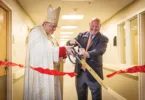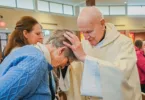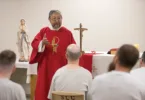
Father Stanley Rother, a priest of the Oklahoma City Archdiocese who was brutally murdered in 1981 in the Guatemalan village where he ministered to the poor, is shown baptizing a child in this undated photo. The Archdiocese of Oklahoma City announced the North American priest will be beatified Sept. 23 in Oklahoma. (CNS)
by Marc and Julie Anderson
mjanderson@theleaven.org
ATCHISON – It’s official.
Abbot James Albers, OSB, head of St. Benedict’s Abbey here, and Father Meinrad Miller, OSB, chaplain of Benedictine College, can both say they’re related to a recognized martyr.
Both priests have familial ties to servant of God Father Stanley Rother of Okarche, Oklahoma, who was murdered July 28, 1981, while serving at the mission of Santiago Atitlan in Guatemala.
Last December, Pope Francis declared Father Rother a martyr, clearing the path for his beatification. On March 13, the Archdiocese of Oklahoma City received word the beatification will take place Sept. 23 in Oklahoma City.
It’s a fact that Father Meinrad finds inspiring for him personally, especially as it relates to Father Rother’s first name.
“My name, before becoming a monk, was Stanley. An aunt of mine told me I should keep my name because I had a relative who was a priest who was killed in Guatemala,” Father Meinrad said.
Abbot James, who enjoys genealogy, said it’s been interesting to discover the number of priests and religious in his family tree, including Father Rother.
“[Father Rother] was actually in my genealogy program,” said the abbot, who uses a computer program to conduct research.
“I had him plugged in. We have several priests and religious in our family,” he said. “At the time I first learned about him, I thought, ‘There’s another one.’”
Abbot James admits he didn’t give the priest much thought after that until Bishop Edward Weisenberger, of the Diocese of Salina, mentioned the martyr at an event which Abbot James attended.
Bishop Weisenberger serves as the promoter of justice for the cause for canonization. His role is to help the church study and examine the life of Father Rother. The promoter, he said, is there to ask not only the “nice questions” but also to “ensure that all the facts are uncovered in the process and that all questions, including difficult questions, are asked.”
That role has included several trips to the mission in Guatemala.
“It’s always a very moving experience,” said the bishop, “especially to spend some quiet time in the room of the parish rectory that still has the marks of the bullet holes where Father Rother was killed.
“It has been turned into an unofficial chapel where people still slip in to pray.”
Having served as pastor of Father Rother’s home parish in Okarche, the bishop said he got to know members of the Rother family personally.
“When the cause began, I was a former pastor of Holy Trinity Parish in Okarche, having served there from 1995-2002,” the bishop said. “Those were seven exceptionally happy years of my life. That parish has produced a host of vocations to priesthood and religious life.”
“It should not be surprising that such a vibrant parish would produce vocations and now a potentially canonized saint.”
When Abbot James attended that event with Bishop Weisenberger, he said it was easy to understand the bishop’s enthusiasm.
That event also helped the abbot to realize he might have a connection to the late priest, one he later verified using his genealogy program. His great-great-great-great-grandparents were the same as Father Rother’s great-great-great-grandparents, making he and Abbot James’ father third cousins, meaning the abbot is a third cousin once removed.
That same genealogical research led the abbot to discover another tie. He and Father Meinrad are related. Father Meinrad’s great-great-grandparents are the same as of those of Father Rother’s great-great-great-grandparents.
Even with these connections, Abbot James said he still does not know much about Father Rother’s life other than what he has read. Currently, he is reading “The Shepherd Who Didn’t Run,” a biography published by Our Sunday Visitor, and often shares bits of Father Rother’s story as a recent example of someone who led a holy life.
That’s a sentiment with which Archbishop Paul Coakley, of Oklahoma City, agreed.
“Tertullian said in the second century that the blood of martyrs is the seed of Christians,” the archbishop said. “Martyrs are witnesses to the truth of the Gospel of Jesus Christ. It is hard to argue with such fidelity, even unto death. Witnesses to the faith are crucial in the process of evangelization and the transmission of the faith. We need such credible witnesses today, as in every age, to inspire and encourage us in the midst of our daily trials
The archbishop grew up in Overland Park and graduated from the University of Kansas. He also studied at Mount St. Mary Seminary in Emmitsburg, Maryland, Father Rother’s alma mater.
“When I learned that I was being appointed as archbishop of Oklahoma City, one of the first things that came to mind was that this was the home of Father Rother,” the archbishop said.
“I had first learned about him when I was a seminarian at his alma mater,” he added. “He was killed when I was a seminarian there.”
“I have always been inspired by his witness,” he continued, “and so was thrilled at the prospect of being able to continue the work of my predecessor, Archbishop [Eusebius] Beltran, in promoting his cause during the Vatican phase of the process.
“Even before the official public announcement that I had been appointed the new archbishop, I made a clandestine visit to Okarche, Father Rother’s hometown, to pray for his intercession.”
The archbishop prays that Father Stanley Rother’s life will inspire Catholics.
“It is my hope that the upcoming beatification and the grace associated with such an event will become a catalyst for the renewal of faith in Oklahoma and the spread of the Gospel of Jesus Christ as embodied and proclaimed in the Catholic Church,” he said. “I hope it will inspire a longing and desire for holiness among all our people.”
Abbot James said he and Father Meinrad plan to attend the beatification.
“I like to touch history, and this is an example of touching the history of our faith,” the abbot said






